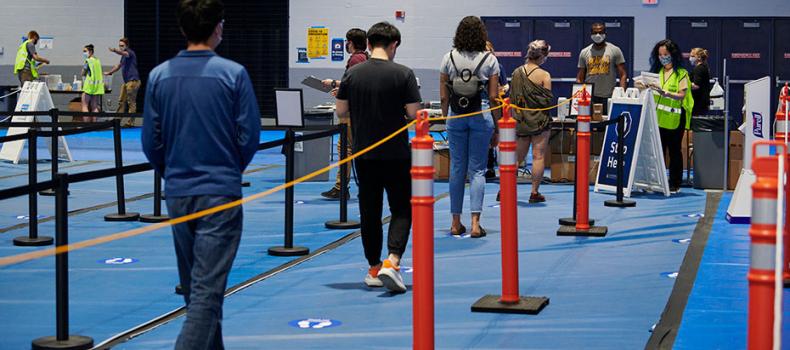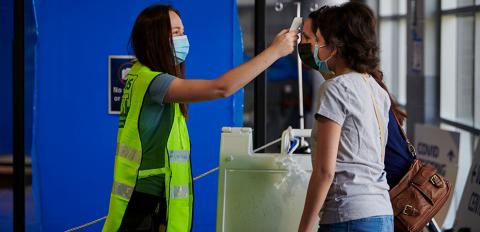With focused curricula and an alumna’s creation of a $2 million endowed fund with MetroHealth, the nursing school homes in on community health
By Mark Oprea
In early 2020, Melissa Kline, DNP, RN, experienced what may have been her greatest career lesson on the power of community health nursing. As thousands of low-risk people on Cleveland’s west side tested positive for the novel coronavirus, she sent two MetroHealth System nurse practitioners on the road—literally—gassing up an RV equipped with 4G-powered vital-signs monitors.
Within months of working with these nurses in their communities, residents were seeking preventive measures on their own, such as pulse oximeters—and they knew how to use them, thanks to the education from on-the-go nurses.
“We were able to keep hundreds of [COVID-19] patients out of the hospital,” said Kline, chief nursing officer and senior vice president of patient care services at MetroHealth Systems.
This commitment to community health—meeting patients where they live to educate them, advocate for their well-being and, ultimately, prevent hospital stays—is part of what Kline brings to Case Western Reserve as a new assistant professor at Frances Payne Bolton School of Nursing.
And at the core of this focus on community-based health care is a $2 million endowed fund at MetroHealth from alumna and nurse-turned-philanthropist JoAnn Glick, RN (NUR ’79), and her husband, Bob, the former CEO of clothing retailer Dots.
As part of a significant investment in the MetroHealth System to reverse health inequities across Greater Cleveland, the Glicks created the JoAnn Zlotnick Glick Endowed Fund in Community Health Nursing. Managed by MetroHealth, it will support an endowed professorship, held by Kline, and other initiatives at Frances Payne Bolton School of Nursing. All involved hope the collaboration of MetroHealth and the nursing school will result in a resounding payoff: more nurses ready to improve the health of their communities.
Funding the future
The use of the endowment fund, which is still in its planning stages, could crystallize in a number of ways at Frances Payne Bolton School of Nursing, Glick said. She envisions anything from a revised clinic-based practicum, to added guest lecturers, to re-inventing CWRU’s dormant master’s in community health nursing program.
A stronger focus within the school, said Kline, the inaugural JoAnn Zlotnick Glick Endowed Professor of Community Health Nursing at the School of Nursing, will help respond to COVID-19’s devastation of hard-hit populations as well as advance a long-running push to move treatment from being reactive to proactive.
“What we’re seeing now is a shift of trying to keep patients out of that acute care side,” Kline said, “and out of the hospital.”
Glick spent the bulk of her nursing career at Cleveland’s Mt. Sinai Hospital—just minutes from Case Western Reserve’s campus—studying “the inequities of the health care system.”
The problem, Glick said, is that “we have policies that don’t take into account the importance of social determinants of health,” or the conditions and environments in which people are born, live, work, learn, play and worship. Social determinants may include, according to the Centers for Disease Control and Prevention, safe housing, transportation and neighborhoods; racism, discrimination and violence; education, job opportunities and income; access to nutritious foods and physical activity opportunities; polluted air and water; and language and literacy skills.
Community health nursing, Glick explained, plays a critical role in understanding and acknowledging those determinants—and devising solutions to address the inequities they create.
Stressing social determinants
Although community health has been taught in colleges since the nursing school’s namesake, Ohio Congresswoman Frances Payne Bolton, introduced the U.S. Cadet Nurse Corps training program at the height of World War II, it has often lagged in practice and prominence.
In the decade after the 2008 Great Recession, the country lost nearly 55,000 public health workers. A Public Health Leadership Forum in 2018 declared a $4.5 billion deficit in community health spending. And that was pre-COVID-19, which upended health care and the health of communities.
At the tip of the pandemic’s first wave, a group of leading scholars from Boston and New York wrote a criticism of the U.S.’s preference for inpatient care nurses, even though there is a desperate need for them outside the hospital, working in their communities. “Yet, despite their critical role,” the authors wrote in their 2020 Public Health Nursing editorial, “[such] positions have been underfunded, left vacant, eliminated or replaced over the past three decades.”
And in its Future of Nursing Report 2020–2030, the National Academy of Medicine calls for greater health equity and access to care, and emphasizes the importance of public health, primary care and home care, as well as community engagement, to improve the health and well-being of the U.S. in years to come.
Carol M. Musil, PhD, RN (NUR ’79; GRS ’91, nursing), dean of Frances Payne Bolton School of Nursing, said the fix needs to start in the schools where nurses are trained. Musil hopes the Glick fund’s professorship and other initiatives between MetroHealth and Case Western Reserve will spark an educational movement across the country to redesign programs to focus on social determinants of health.
“There have been too few initiatives that are really trying to understand and tackle those upstream social determinants,” Musil said. “And that’s the thing we’re trying to affect, so we can improve lives.”
Community-focused curriculum
Frances Payne Bolton School of Nursing offers 19 community-health-related classes across its degree programs, ranging from introductory courses such as “Health Care in the Community,” to the senior capstone “Population Health Practicum,” to graduate-level seminars such as “Modalities for Family Systems Practice: Vulnerable Family Populations.”
For Beverly Capper, DNP, the director of the Bachelor of Science in Nursing program, the COVID-19 pandemic has heightened the need for her program’s five community-intensive courses. From guiding students on how to teach health literacy to residents in Cleveland’s predominantly Latinx Clark-Fulton district to following a senior’s 280-hour capstone project on lead poisoning toxicity in the city’s majority-Black Glenville neighborhood, the variety of courses are in high demand for students, Capper said, and also “fill a gap of practice with the community partners.”
Throughout the courses, Capper and other instructors emphasize the critical importance of understanding the communities and cultures in which students study and work.
As a specialist in neonatal nursing, Capper knows, for example, the risks of Sudden Infant Death Syndrome (SIDS), which is particularly prevalent in the east side’s Black population (Cuyahoga County has the highest rate of SIDS in the state), and of a nurse caring for a family without cultural knowledge. Ascertaining why a mother is sleeping with her baby in bed, for instance—Does she have heat? What about a crib? Is this simply how her own mother raised her?—is just as key as knowing how to treat the infant, Capper said.
“Parents have good intentions. They want to protect; they want to take care of their baby,” Capper said. “But sometimes they don’t understand the risk that puts them in. By bringing the baby into bed with them, they’re trying to keep them warm. But blankets pose a higher risk for strangulation.”
Delving deeper into culturally based reasonings for sleeping arrangements, or any other at-home investigation, requires nurses “to put their critical-thinking hats on a little bit more,” Capper said.
The need to better understand patients is instilled across the school’s Master of Science in Nursing and Doctor of Nursing Programs as well. Yet for Latina Brooks, DNP (CWR ’93, ’95; NUR ’98, ’02), the programs’ director and an assistant professor, it’s not enough. It’s clear that 19 months of COVID-19 have arisen ugly social inequities in relatively every discipline and drawn a clear need for strengthened programming to prepare students.
“One of the mistakes I think that’s made in health care is that people go in and just do before they actually determine what actually is happening and also what the community wants,” Brooks said. “We say, ‘Oh, this is what they need because we know this will help diabetes.’ But no one ever did an assessment of the community to see what resources they had in the first place!”
Which is precisely why Frances Payne Bolton School of Nursing puts community outreach at the core of its curriculum—with students at all levels engaging in clinical learning at more than 200 Cleveland-area community agencies and organizations each semester, including the Cleveland Metropolitan School District, where nursing students conduct health screenings, including testing for lead levels, and educate children on a variety of age-appropriate, healthy-lifestyle strategies.
Plus, BSN, MSN and DNP students work with community agencies to conduct a service-learning project that helps them understand the health issues in their community, learn the context in which services are provided, and understand connections among their experience, coursework and their roles as health care professionals.
The pandemic has created another opportunity to put community-health knowledge to use: Nursing students have become integral in the university’s and city’s COVID-19 vaccine responses, volunteering at clinics as public health educators as well as dose distributors. Beginning in March, about 120 BSN and MSN students worked alongside Case Western Reserve’s medical and physician assistant students to administer more than 20,000 vaccines. And each day, as many as 20 students staffed vaccine sites across the city—from community center clinics to mobile units to the university’s own site.
Maggie Puc-Lakomy, a third-year BSN student, got her first beyond-the-hospital clinical experience at a flu vaccination clinic in fall 2020; months later, she started distributing the Moderna, Pfizer and Johnson & Johnson COVID-19 vaccines at Case Western Reserve’s clinic. Alongside the clinical skills needed to actually inject the shot, Puc-Lakomy also had to tap into her social and empathic skills to alleviate patients’ anxiety and reassure them of the vaccines’ safety.
That became even more essential in November, as she and her classmates gave the newly approved COVID-19 to children ages 5 to 11 at a Neighborhood Family Practice community health center in Brooklyn, Ohio.
“When I talked with adults to calm them, I focused a lot on the fact that this shot is going to help them and everyone else around them,” said Puc-Lakomy, who had never before given a shot to a child. “But for younger kids, it’s more ego-centric: ‘Because of this shot, you’re going to be healthy—you’ll be OK!’”
She’s learned these varying approaches in her classes and hospital-based clinicals, but said the opportunity to provide care in the community was a “completely different experience” that she enjoys as a counterpart to her in-patient pediatric work.
“These are healthy people coming in to prevent themselves from getting sick, and I get to be part of preventing them from getting a horrible virus,” Puc-Lakomy said. “To be able to meet people from across the Cleveland community and our smaller community at Case Western Reserve—it’s just been really rewarding to know we’re helping out the people around us.”
It’s that in-the-community, impactful experience Kline and Musil hope the Glick fund will help MetroHealth and Frances Payne Bolton School of Nursing provide to more students—from undergraduates to doctoral candidates—who are looking to make an impact in their own communities, especially those that are underserved.
“Our focus has long been on reducing health disparities and improving overall well-being for people in general but also within our Cleveland community,” Musil said. “The pandemic has proven just how critical—life or death, actually—it is to make real, lasting improvements in the health of our communities.”



